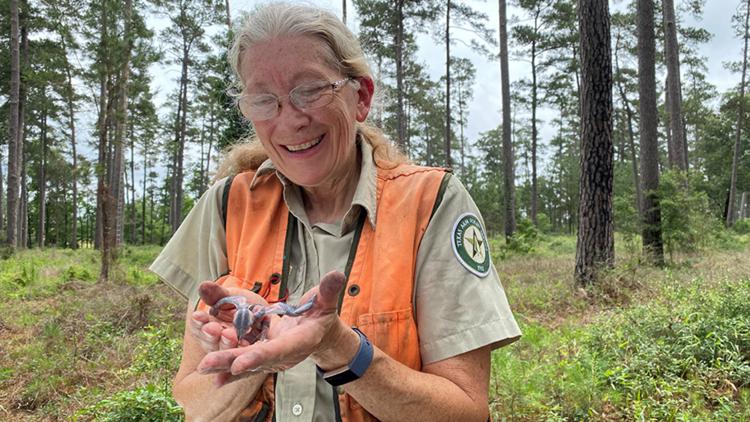TEXAS, USA — The red-cockaded woodpecker is no longer classified as a federally endangered species, according to the Texas A&M Forest Service.
Texas A&M Forest Service said the bird species was reclassified by the U.S. Fish and Wildlife Service to "threatened" after reviewing several years’ worth of data and other information following a decades-long conservation effort. The red-cockaded woodpecker had been an endangered species for the past 54 years.
"Many of the populations of these woodpeckers are currently stable or increasing," the Texas A&M Forest Service said in a press release.
The red-cockaded woodpecker is a unique, non-migratory woodpecker species that resides across the southeastern United States. The species was originally classified as endangered in 1970 when it was estimated that there were fewer than 10,000 individuals and between 1,470 active clusters — family groups of one or more individuals.
Now, it is estimated there are 7,800 active clusters ranging from Virginia to Texas. Over 1,800 red-cockaded woodpeckers call East Texas home – residing at the W.G. Jones and I.D. Fairchild State Forests as well as Texas’ four National Forests and a few private lands, Texas A&M Forest Service officials said.
Texas A&M Forest Service has collaborated with state and federal agencies, as well as private landowners, on these conservation efforts.
Donna Work, Texas A&M Forest Service Biologist and Red-cockaded Woodpecker Coordinator, has led these efforts for the agency since 1996.
“I’m glad to see that many of the populations are improving enough across this bird’s range for them to be downlisted,” said Work. “All the wonderful partners I have worked with have helped me tremendously with knowledge and management of these special birds. Together, we can continue to keep our Texas populations healthy and thriving.”
Management activities on the W.G. Jones and I.D. Fairchild State Forests include habitat improvement through underbrush reduction, tree thinning and prescribed burning; adding artificial cavities where needed; and monitoring for nesting and banding the nestlings at times.
Work said red-cockaded woodpecker conservation efforts will continue as she helps educate landowners and the public on the importance of good forest management.
“The good thing is, when we follow good forest management practices, we are not just helping the RCW, but also a host of other wildlife, insects and plants that are associated with the same ecosystem,” said Work.
Even though the classification has improved, Work said the red-cockaded woodpeckers will continue to be protected.
More Texas headlines:



